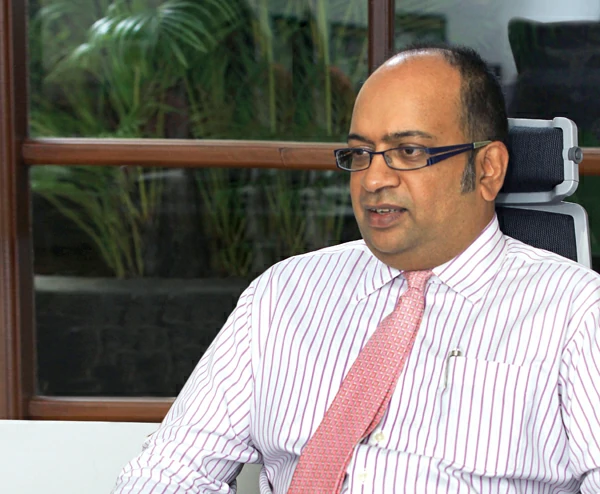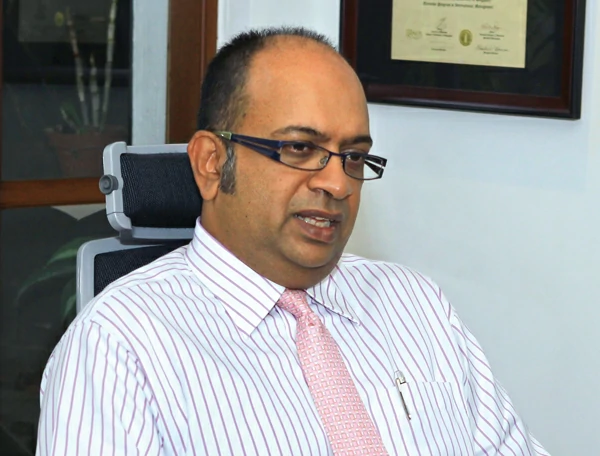
With emphasis on innovation and value addition, Watawala Plantations has grown to be recognised as one of the largest tea plantation companies in Sri Lanka. A joint venture with TATA Global Beverages, Watawala Plantations prides itself in being a producer and exporter of pure Ceylon tea and has set new standards in offering ‘a good cup of tea’. Vish Govindasamy, Managing Director of Watawala Plantations outlined the company’s performances over the years and spoke on the strategies for the future as it strives to further strengthen its presence in the local and global markets.
By Madhushala Senaratne | Photography Mahesh Prasantha
Watawala Plantations is one of the largest tea plantation companies in the country. Can you tell us about the company’s performances over the years?
Watawala Plantations is one of the regional plantation companies, which was privatised by the Government in 1996. Watawala has three crops, which are tea, rubber and palm. At the time of privatisation Watawala was the only company that produced palm oil, and the only company that owned a palm oil mill. At that time the company was incurring a large loss. It has been about 15 years, and we have been making very good profits from tea, rubber and palm oil every year with the exception of one year when the tea market was performing badly and we sustained a slight loss.
Upcountry tea has always been a challenge; as in all the plantations, our portfolio includes estates that perform well and a few that do not perform well. Therefore, managing the poorly performing estates is a great challenge. The well performing estates are making good profits. Kenilworth, Waltrim, Dikoya and Henfold are our top estates.
Our partners, TATA have successfully added value to their tea in India. We have learned from their experiences and have created a brand by the name of Zesta. We also gave it our identity by saying that it is ‘plantation fresh’. Being a plantation company we can call it truly plantation fresh because we grow, produce and take the tea to the people. We can confidently tell the customer that the tea was grown in our own plantations.
At The Time We Created Zesta, Though There Were Many Local Brands In The Market, We Were Able To Set The Standard For A Good Cup Of Tea For The Sri Lankan Population… We Created Another Popular Brand By The Name Of Watawala Kahata, Which Today Is The Flagship Brand Of The Company.
At the time we created Zesta, though there were many local brands in the market, we were able to set the standard for a good cup of tea for the Sri Lankan population. From its inception we packaged Zesta in a plastic container, where people could see the colour of the tea, as until then the tea that was sold in Sri Lanka was more brown than black. Therefore, we showed the customer through our packaging that we were selling black tea. Additionally, we also introduced BOPF Tea to the consumer. Until then people thought that BOPF Tea was only available from the estate and could not be purchased at a retail outlet.
We created another popular brand by the name of Watawala Kahata, which today is the flagship brand of the company. We now have a market share in excess of 30 percent of the local market. As a result, the Fast Moving Consumer Goods Division was started, and last year we created a new subsidiary by the name of Watawala Marketing, which is a 100 percent subsidiary of Watawala Plantations and is responsible for the marketing of all products.
In addition to tea, we produce and market Zest Water, and recently added our own refined palm oil – Oliate – to the market. We are truly a FMCG company with our own brands. We have gone beyond being a traditional plantation company, which only grows and auctions tea. We export our products to overseas destinations such as Australia, New Zealand and a few other countries.
Can you tell us about the partnership with the TATA Group? What is the significance of this venture?
We have a 51:49 joint venture with TATA Tea, which is now known as TATA Global Beverages. They own the world’s second largest tea brand; Tetley. This is a mutual partnership and we have been able to share expertise. The idea of value addition and branding came from their success in India. We also share our experiences and ideas with them. Therefore, it is an excellent partnership.
What about the local tea market, what are the current trends and developments?
If we look at the local tea market, usually it is very difficult to sell a product at its place of origin. Sri Lanka is known for its tea. There are many players and the market is very crowded as such people have the choice of buying tea from anywhere they want. To succeed you need to give a consistent and quality product, which the consumer can trust, and that is basically the secret of our success. We have been able to continuously provide a product of very high quality to the consumer, which they trust. In addition, we are a pure Sri Lankan brand.
The Government in its 2011 Budget is encouraging value addition and the export of raw form/bulk tea is discouraged. The export CESS on bulk tea was increased to ten rupees per kilogram. Can you tell us how this will affect the tea industry?
The CESS on bulk tea was actually introduced to help the industry. Firstly, to increase the export of value added tea. Sri Lanka is known to export bulk tea on a large scale, rather than value added tea. Therefore by increasing the CESS on bulk tea, people will make sure value added tea is exported.
Secondly, there is a component of the CESS, which will be provided to market Ceylon tea abroad. There is a committee that has been appointed by the Tea Board who will plan out a way to promote Ceylon tea overseas.
Today, Sri Lanka manufactures approximately 325 million kilograms of tea. Replanting is required for higher productivity, as most of the upcountry tea bushes are very old. Simply growing and producing more tea is not going to help. In addition, the consumption of tea around the world is quite stable, it grows only by a small amount. Therefore, we should focus on quality and increasing productivity.
How does the company market the value added tea overseas?
Value added products are the branded products. We have to innovate and create new products. We have a full range of flavoured teas, organic teas and herbal teas. Value addition requires innovation and we also focus on how we package our product. We use invoative packaging such as tin caddies to ensure the freshness of the tea, now there is staple free tea bags, which are very important to the consumer.
We have tea boutiques, where we sell exclusive teas. At our restaurant Tea Cup in the hill country people can taste and enjoy a fresh cup of tea. We have recently initiated a similar concept in Colombo at the Legends Noritake showroom.
How is the global tea market performing?
Globally people are becoming more aware of tea because it is related to health. People believe that tea is healthy, as it does not contain as much caffeine as in other drinks. It is now becoming fashionable to have flavoured tea such as ginger and lime, which are healthy. USA, which was not a major consumer of tea, is fast becoming an important tea drinking country. Globally people are consuming tea made using tea bags as opposed to bulk tea. Tea cafes, tea bars and tea outlets can be seen increasingly around the world, so, the global trend is improving.
Watawala exports bulk tea to many parts of the world, can you elaborate on this – what are your main markets and how significant is this to the company?
Watawala is not a large-scale exporter of bulk tea. We do export bulk to our partners Tetley and TATA, but to other destinations we export our branded tea. We focus on value addition, especially with our partners, where we do their branded packaging in Sri Lanka. Our export markets are mainly Australia, New Zealand, Singapore, Japan and Hong Kong.
Watawala has also recorded growth in other sectors such as rubber and palm oil, can you tell us about your performance here?
Our rubber factory in Nakiyadeniya is the largest rubber factory in Sri Lanka, but that is the smallest part of our business. We have expanded our palm oil plantation and extended the planted land area. We have our own refinery and product brand, Oliate. I am sure that the same success that we have achieved with Zesta and Watawala Kahata will be achieved with Oliate. Palm oil is going to be one of the most successful commodities in the world, because it is directly related to food, it is something that you need on a day to day basis for your cooking. Palm oil is used in the cosmetics industry very widely. We are very bullish about our palm oil, and in the future we will continue to build on this segment.
What are the challenges that the company had to face in the recent past and how did you overcome them?
The main challenge was to make sure that we continuously provide quality products. The weather patterns in the last few years have been extreme and tea is very much dependent on weather. There are not many barriers to enter the tea market. However, many are not able to sustain the business because they are unable to maintain quality for a long time. One of our main challenges going forward will be cost of production versus productivity.
We Should Focus On Quality And Increasing Productivity… Many Are Not Able To Sustain The Business Because They Are Unable To Maintain Quality For A Long Time. One Of Our Main Challenges Going Forward Will Be Cost Of Production Versus Productivity.
What measures will be taken to further strengthen the company’s presence in the local and global markets?
Locally, our aim is to be the biggest branded tea company in the local market and we are really working hard to achieve that aim. We recently re-launched our main brand Zesta with a new look and new feel, while maintaining the high standard at the same price. We will continue to do that with Watawala Kahata as well, which is a very popular tea in the local market. We will also expand to new areas, where we could not reach until now. We also intend on introducing new and innovative tea products into the local market. Globally, we will focus on our presence in Australia and New Zealand first, and then we intend to venture into other markets.






